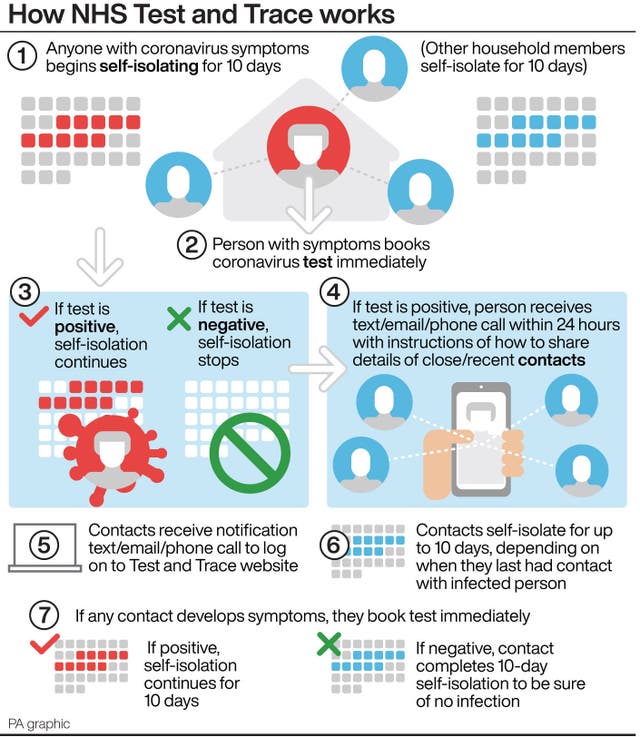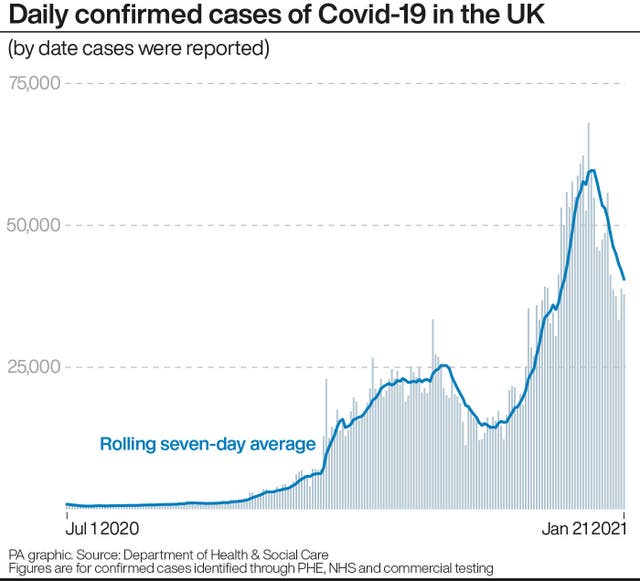£500 payment to everyone who tests positive being considered – minister
It is estimated the proposal of extending £500 payments to everyone who tests positive for Covid-19 in England would cost up to £453 million per week.

Ministers are considering paying £500 to everyone who tests positive for coronavirus to increase the number of people abiding by quarantine rules, a Cabinet member has confirmed.
Environment Secretary George Eustice stressed the need for people to comply with the isolation rules when contacted by NHS Test and Trace amid concerns of low compliance.
Scientists welcomed the suggestion of more financial support but Treasury sources were adamant the plan will not go ahead, with one telling the PA news agency bluntly: “Won’t happen.”
The proposal of extending £500 payments to everyone who tests positive for Covid-19 in England, rather than just those who are on low incomes and are unable to work from home, is estimated to cost up to £453 million per week.
It is the “preferred position” of Matt Hancock’s Department of Health and Social Care, according to a leaked document seen by The Guardian.
Mr Eustice told Sky News: “We do need people, if they are asked to self-isolate because they have been contacted through our Test and Trace, we do need them to self-isolate.
“And, obviously, we always review the reasons why they might not.”
On the payment, Mr Eustice added: “No decisions have been made on this.
“We are always keeping multiple policies under review.”
There was hostility to the proposal in some parts of the Government, with one source saying the plan “incentivises people to catch Covid”.
But there was support from experts, with Professor Stephen Reicher, who is advising the Government’s coronavirus response, saying universal payments to self-isolate must form an “essential element of our pandemic response”.

The Scientific Pandemic Insights Group on Behaviours (Spi-B) adviser told BBC News: “You can’t have a bureaucratic system, you can’t have a system where people don’t know whether they will get the support or not, it has to be immediate.
“The way to do that is to make it universal.”
He said a “comprehensive package of care”, including easy access to money, is “the big hole that we have to fill if we want to succeed”.
Dr Mike Tildesley, from the Government’s Scientific Pandemic Influenza Group on Modelling (Spi-M), said that “one of the key problems actually is people isolating”.
“Some kind of support for people so they can see through their isolation is actually pretty important, so that we really do get on top of these numbers,” he told Times Radio.
Dr Tildesley suggested there are signs the “lockdown is possibly working” in getting the virus’s spread under control, but said it is “unclear how we can tighten restrictions further”.
Mr Eustice said a full border closure to all visitors from abroad has been considered, adding that there “is concern at the moment about the number of mutant strains”.
He said the nation will be “getting back to life closer to normal” in the summer, telling ITV’s Good Morning Britain: “It may not be back to normal, but we will be by then, let’s hope, out of the lockdown.”

The £500 payment plan was reportedly prompted by Government polling indicating that only 17% of people with symptoms are coming forward for testing.
Some 25% are thought to comply with rules to self-isolate for 10 days after testing positive and 15% continue to go to work as normal.
The Resolution Foundation think tank said the current approach, which it estimates only around 13% of workers are eligible for, is “not fit for purpose”.
Researcher Maja Gustafsson said: “Swiftly putting in place a much more universal and generous system will make a real difference to controlling the spread of the virus.”
In other developments:
– Prime Minister Boris Johnson is due to lead a Downing Street press conference at 5pm.
– Police broke up a wedding attended by around 400 people in a school in Stamford Hill, north-east London.
– Scientists warned it is “pretty much impossible” for the UK to reach herd immunity against Covid-19 because while vaccines will drastically reduce severe illness they will not suppress infection completely.
The Government is grappling with ways to bring the infection rate down as the vaccine programme is rolled out.
Mr Johnson has been unable to rule out that the national lockdown in England may last until the summer.
As 1,290 further deaths in the UK were reported on Thursday, Home Secretary Priti Patel announced a new £800 fine for people who attend house parties with more than 15 people.
In Northern Ireland, the lockdown was extended for a further four weeks until March 5.
Official figures up to January 20 showed 4,973,248 people had received a first dose of a coronavirus vaccine, an increase of 363,508 from the previous day.
Based on the latest figures, an average of 401,070 people a day will need to be vaccinated to meet the target of reaching the 15 million highest priority cases by February 15.





